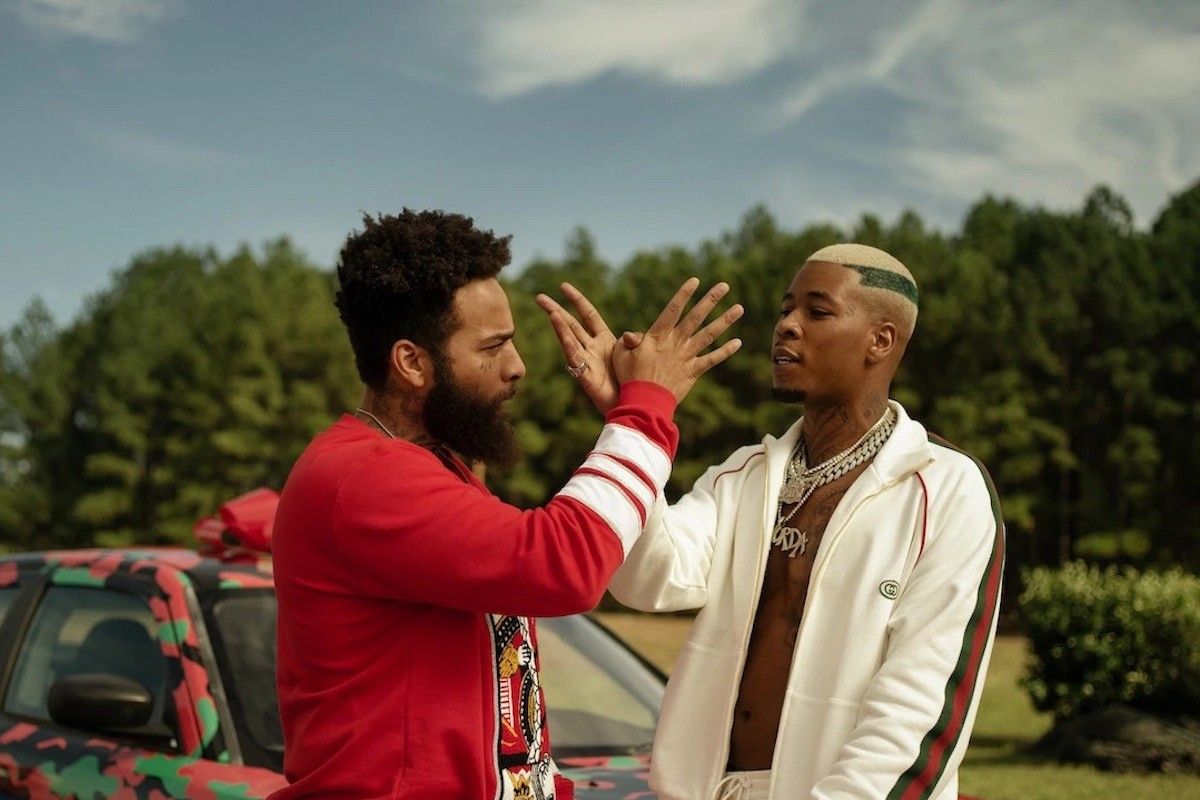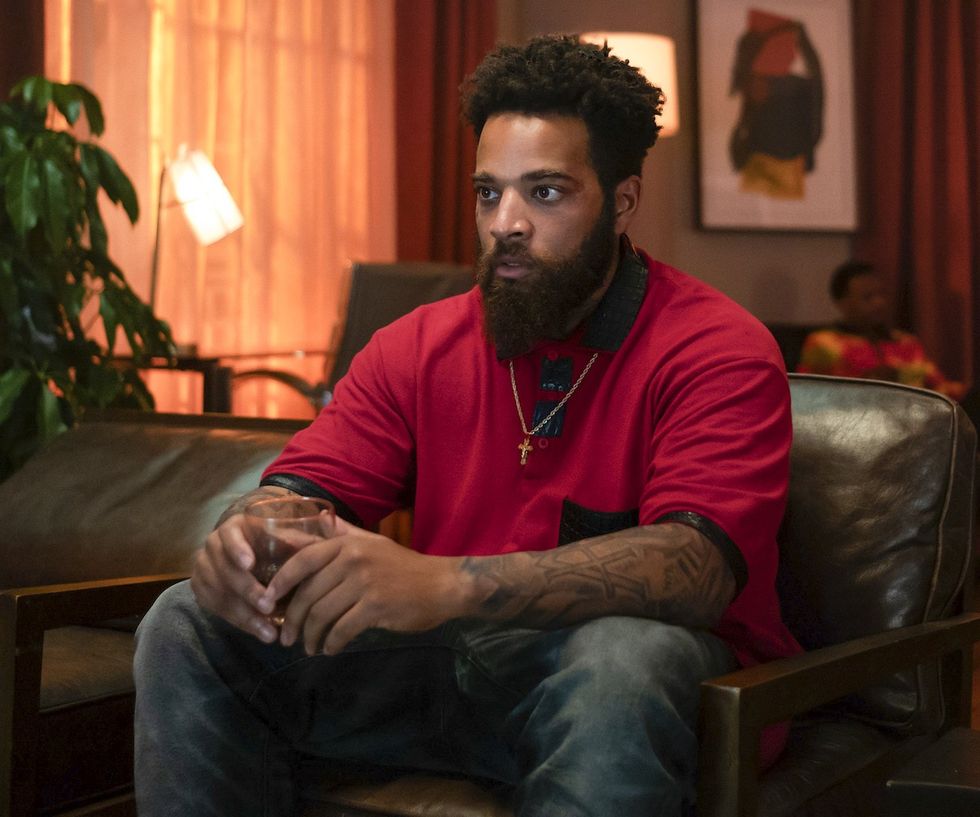
P-Valley lil murda and big teak handshake
Photo Credit: Curtis Baker/ Starz
To continue reading
Create a free account or sign in to unlock more free articles.
By continuing, you agree to the Terms of Service and acknowledge our Privacy Policy
Register
The content is free, but you must be subscribed to Okayplayer to continue reading.
THANK YOU FOR SUBSCRIBING
Join our newsletter family to stay tapped into the latest in Hip Hop culture!
Login
To continue reading login to your account.
Forgot your password?
Please enter the email address you use for your account so we can send you a link to reset your password:

Even before the finale aired over the weekend, the second season of P-Valley had been hailed a masterpiece. The Starz soap opera, from showrunner Katori Hall, hones in on stripper culture, creating memorable characters, and holding viewers’ attention with higher stakes every week. Although the Chucalissa, Mississippi strip club, the Pynk, is closed until another season, the show strings along serious issues beneath its neon, sex-soaked aesthetics.
P-Valley confronts gentrification, domestic violence, and abusive parenting. One of its lead characters, Uncle Clifford (Nicco Annan) who runs the Pynk, is a Black queer femme who uses fashion to disrupt gender. However, where the show really shines — particularly in season 2 — is the topic around the mental health of Black men. This is portrayed by a tragic character death.
The first time we see the character of Big Teak (played by John Clarence Stewart), is in the season's second episode, "Seven Pounds of Pressure." Up-and-coming rapper Lil Murda (J. Alphonse Nicholson) picks him up from jail. It's the least he could do. Big Teak was sent to jail for 10 years for the murder of someone who had attempted to kill Lil Murda. A member of Lil Murda’s gang, the Hurt Village, Big Teak’s devotion to the rapper is complex. From the outside looking in, it manifests as brotherly loyalty entrenched within street gang formations. But their bond also codes for a deeper emotional attraction.
Trying to pick up his life and start afresh, Big Teak reconnects with Lil Murda as he commences his “Dirty Dozen” tour with Keyshawn (Shannon Thornton.) They show up in strip clubs, parties, and lay up in a motel. All along, Big Teak struggles to adapt to this new world. He is either quick to anger or withdrawn. In episode three, "The Dirty Dozen," he pulls out a gun in a street crowd to defend Lil Murda when someone disrespects him.
For every outburst, Lil Murda steps in as a pacifier, resolving the conflict his friend is tangled up in. While Big Teak’s impulsive reactions can be seen as a thug persona cranked up too much, this perspective shifts when the show unravels his past. As a child, he witnessed his mother murder his three siblings. The scarring from his traumatic experience never goes away, haunting him as an adult when he visits his childhood home.
It explains his detachment from people. With Lil Murda, though, things are different. Big Teak brings his guard down, allowing himself to be vulnerable in Lil Murda’s company. Over lemon pepper wings at The Hot Wing Castle, they both realize that they are on a date. Two masculine Black men sharing an emotional connection – in fact, the idea that they could be in love – isn’t so common on streaming or cable television, let alone movies.
While Big Teak never talks about his queerness on the show, we can’t dismiss the effects homophobia has on his mental health, especially as a Black men. From depression, suicidal thoughts, self-harm to anxiety and stress increase, Black men and boys who are gay or bisexual experience varying degrees of this outcome. Poverty and racism can negatively compound these realities.
Big Teak's heartbreaking story arc comes to an end in episode six, "Savage." Big Teak commits suicide. Before it happens, he’s in a fully nihilistic mood, as he sits in a parked car with Lil Murda. Under a night sky, tucked away in the woods, he tells Lil Murda he doesn’t want to be around anymore. It can be argued that the trigger for this is Big Teak discovering Lil Murda’s on-and-off relationship with Uncle Clifford. The realization that Lil Murda doesn’t belong to him anymore may have set Big Teak on this path of fatalism.
Earlier that day, Big Teak gets a fresh haircut and wears a red sweater with the graphic print of the King of Hearts, the card game. The King of Hearts is also known as the Suicide King, and this foreshadowing goes by undetected by viewers until Big Teak’s death. If anything, it points saliently to how we always use appearance as a visual barometer of mental health.

Appearance, or what people show, can signal a crisis in mental health. Other times, it can be inadequate. For Black men, who are often inscrutable because of patriarchal teachings that demand strength and no emotions, mental health interventions require more patience and empathy. Many Black men have been victims of abuse and sexual assault by adult women when they were boys. Many Black men, also, don’t often possess the emotional lexicon to navigate interpersonal relationships.
As a consequence, traumas continue to fester in a way that poisons their interactions with others. There are Black men who acknowledge their emotional shortcomings. But the pitfalls is usually a paradox. They fear that their emotional vulnerability would be weaponized against them by their intimate partners, and it informs the reason they would rather keep their emotions to themselves. This is a valid critique from Black men on the realities of patriarchy and how it’s utilized across genders.
Episode six ends with suicide hotlines as a great gesture. Conversations on Black male mental health took focus, with several Black men online resonating with Big Teak as a troubled character. It wasn’t without communal support, words of encouragement towards Black men to be easy on themselves and seek therapeutic resources if necessary.
__
Bernard Dayo is a film and fashion critic based in Lagos, Nigeria.